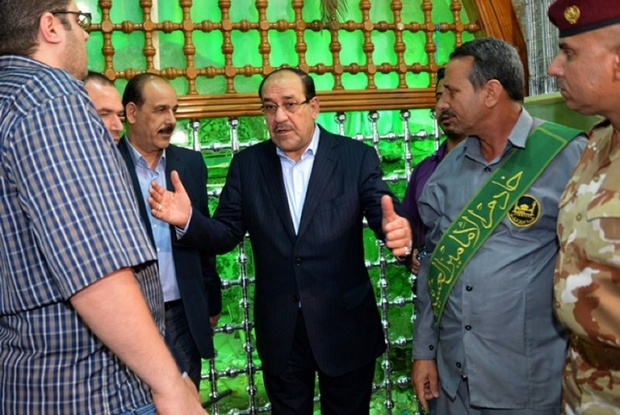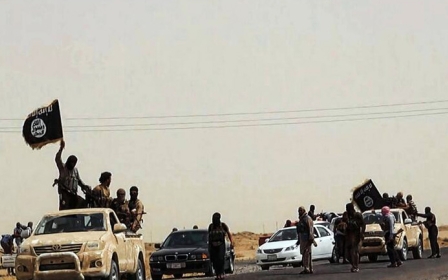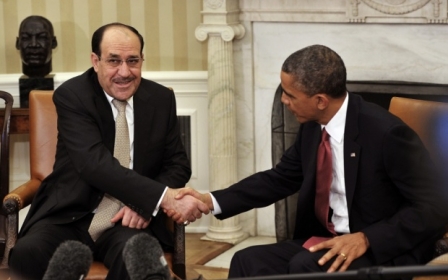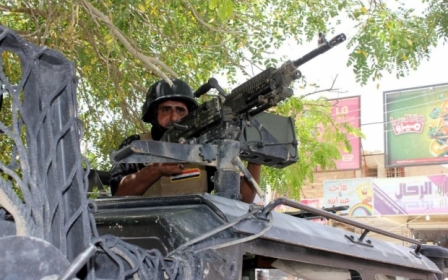Iraq Sunni group calls for autonomy in decentralized Iraq

Demands for Sunni autonomy
A group of Sunni leaders called for a decentralised Iraq, including autonomous Sunni regions, at a press conference in Istanbul on Monday.
"The Popular Movement in Iraq," a political group of Sunni communities, also accused Prime Minister Nouri al-Maliki's Shiite-led government of oppressing Sunnis.
The group said its current priorities are to topple Maliki and to form a unity government.
Mohammed Taha Hamdoun, the Popular Movement's spokesperson, told journalists that the Islamic State in Iraq and the Levant, which has made unprecedented territorial gains since the beginning of June, will not be able to hold such a vast region.
According to Hamdoun, ISIL will need the support of Sunni tribes if they are to maintain control of the territory they have seized, which includes "40 percent of the population" and "60 percent of Iraq’s soil.”
Iraq has been gripped by chaos since Sunni insurgents - led by militants from ISIL - seized the country's second-largest city Mosul on 10 June and advanced towards the capital, Baghdad.
"Some 3,000 people from outside cannot hold control of these regions," said Hamdoun.
He estimated that 10 percent of the fighters were foreign militants.
ISIL had announced the establishment of an Islamic caliphate in Iraq and Syria, and designated its leader, Abu Bakr al-Baghdadi, as "caliph," the head of the state, late on Sunday.
Asked whether they would obey the self-declared caliphate, the spokesperson emphasized that the Popular Movement is not engaged with ISIL's international ambitions, and are only concerned with defending the rights of Sunnis in Iraq.
Hamdoun called on Sunni lawmakers to boycott an expected 1 July parliamentary meeting to elect a president and form a new government for Iraq.
Calls for representation and stability
While some are calling for a boycott, however, others are calling for increased participation from Sunnis, and warning of the need for political stability with Iraq "at war."
Maliki's supporters insist he is still the man to lead the country and warned that - with Iraq mired in what US Secretary of State John Kerry has called an "existential" conflict - replacing the premier, who doubles as commander-in-chief of the armed forces, could worsen instability.
Former MP and Maliki ally Sami al-Askari said the timing of any change was wrong.
"If... there is no current battle, or the current war, OK, maybe. We have time, we have space to change the prime minister, to change the commander," he said. But "this is not the time for the change."
"He is not only the prime minister. He is the head of the army, and Iraq is at war."
On the same day, a group of six regional Iraqi powers, including groups from Anbar and Diyala provinces, announced the formation of a new political alliance under the name “Coalition of Iraqi Powers.”
At a press conference in the heavily-fortified Green Zone of Baghdad, the coalition said that the alliance would be a “political representative” for what are known as the six restive Sunni-majority provinces as well as independent candidates.
All this political positioning comes amid pressure to form a new government swiftly, to help see off the militant advance that has managed to take control of large swathes of the country, including key border crossings.
Maliki's days in office may be numbered, with his reputation battered both by a militant offensive and by increasingly vocal charges of sectarianism.
The incumbent may have won by far the most seats and personal votes in the most recent 30 April poll, but events since then have left him increasingly isolated.
With parliament due to open its first session on Tuesday, Iraq's 328 MPs were to choose a new speaker, a national president and a prime minister.
But Maliki's Sunni and Kurdish rivals are refusing to grant him a third term, while his own bloc - less cohesive than during the previous 2010 election - has been subsumed into a pan-Shiite alliance, thereby lessening his clout.
"There is a discussion going on" within Maliki's State of Law alliance over whether to replace the premier, said a Western diplomat on condition of anonymity.
"There are clearly talks going on," the diplomat said, adding: "It is quite a critical few days... This is an important period politically."
Maliki staked his reputation as the leader who brought violence under control in 2008 as Iraq emerged from a brutal Sunni-Shiite sectarian war.
But the rise in unrest this year, culminating in the sudden advance of Sunni militants who overran swathes of territory, has done significant damage.
Slim chance for Maliki
The formal resurrection of the pan-Shiite National Alliance coalition, which includes both the State of Law party and rival groups, further dilutes the incumbent’s claim to the post.
Maliki had claimed prime ministerial powers on the basis that his party won nearly three times as many seats in the polls as the next closest contender.
Instead, the reformation of the National Alliance raises the possibility that a candidate for prime minister could emerge from any of the alliance's constituent parties.
"After the election, his chances were good, but the security breakdown in the country has clearly hurt him," said Hakim al-Zamili, an MP from the Ahrar bloc loyal to powerful Shiite cleric Moqtada al-Sadr.
"Maliki's chances now are weak under these circumstances - the security problems, problems with the Sunnis, the Sadrists and the Kurds."
Under a de facto agreement, the Iraqi premier - by far the most powerful position in the country - is typically a Shiite Arab, while the parliament speaker is Sunni Arab and the national president a Kurd.
Though no single candidate has emerged as the frontrunner to replace Maliki, several names from within the country's majority Shiite community have been floated.
The well-known figures of former vice president Adel Abdel Mehdi and ex-deputy premier Ahmed Chalabi were confirmed on Monday as possible candidates by the State of Law coalition, alongside current leader Maliki.
But MPs interviewed by AFP from across the political and communal spectrum said that even if the premier were booted from power, choosing a new one could take a month or more.
Sunni political decline
A decline in the proportion of Sunni Arab MPs - a product of the fracturing of Sunni parties, reported threats against voters, the closure of numerous polling stations in Sunni areas among other factors - has also meant that Shiite deputies form the majority in parliament.
Although Iraq's various communities discussed potential premier candidates after previous polls, some Sunni MPs now believe that their opinion matters little.
"This is a fact we have to deal with," said Qassem Fahdawi, a newly-elected MP and the former governor of the western desert province of Anbar.
"We have no influence about this matter. Even if we have an opinion against any person, it will not work."
New MEE newsletter: Jerusalem Dispatch
Sign up to get the latest insights and analysis on Israel-Palestine, alongside Turkey Unpacked and other MEE newsletters
Middle East Eye delivers independent and unrivalled coverage and analysis of the Middle East, North Africa and beyond. To learn more about republishing this content and the associated fees, please fill out this form. More about MEE can be found here.




